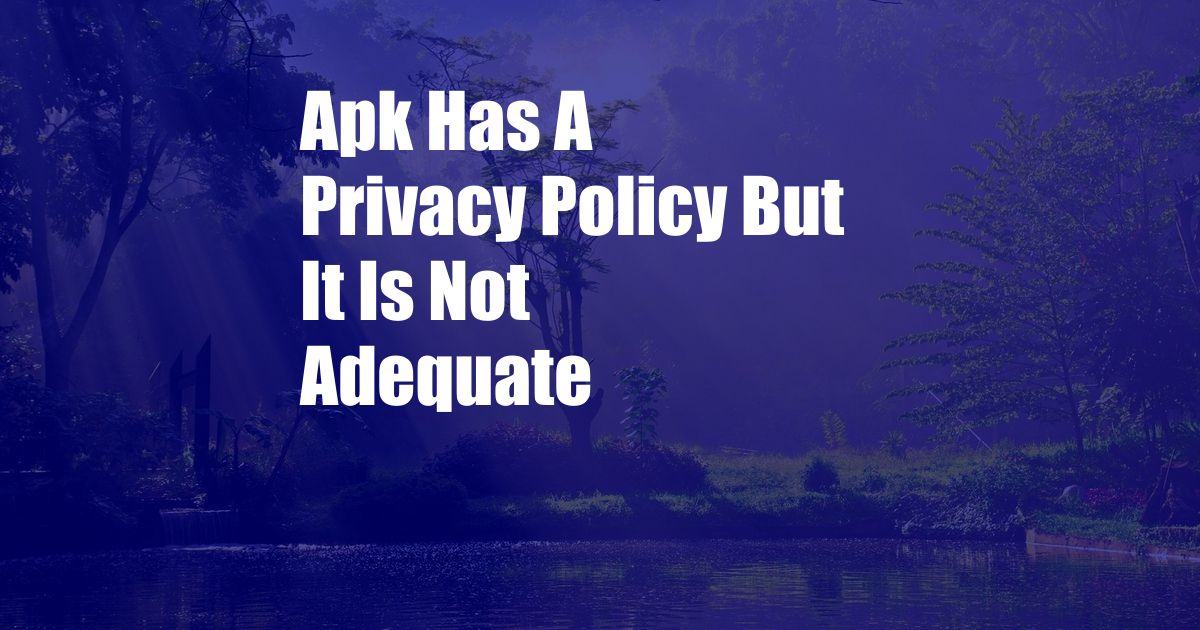
APK Privacy Policies: Navigating the Uncharted Waters
When we delve into the vast realm of mobile applications, the importance of privacy cannot be overstated. We entrust our sensitive information to these apps, assuming that they uphold our right to privacy. However, the reality is often far from ideal, with many APKs lacking adequate privacy policies. This article aims to shed light on this critical issue, exploring the risks and providing guidance for informed app usage.
An APK, or Android Package Kit, is a file format used to distribute and install apps on Android devices. These packages house the app’s code, resources, and data. While Google Play Store enforces certain privacy standards, sideloaded APKs often fall outside this regulatory umbrella, leaving users vulnerable to privacy breaches. Let’s delve deeper into the murky waters of inadequate APK privacy policies.
Unveiling the Inadequate Privacy Landscape
The absence of comprehensive privacy policies in APKs is a pervasive problem. These policies are essential for informing users about the data collected by the app, the purposes of collection, and the safeguards in place to protect user privacy.
Inadequate privacy policies leave users in the dark, unaware of the potential risks associated with app usage. They fail to provide transparency about data sharing practices, retention periods, and user rights. This lack of clarity undermines trust and exposes personal information to potential misuse.
Unprotected Data: The Consequences
The risks of using APKs with weak privacy policies are far-reaching. Without proper safeguards, sensitive information such as location data, contacts, messages, and financial details becomes vulnerable to exploitation. Malicious actors can leverage this data for fraud, identity theft, or targeted advertising.
Moreover, inadequate privacy policies can hinder users’ ability to exercise their rights under privacy laws. Without clear guidance, users may struggle to access or rectify their personal data, leaving them powerless to protect their privacy.
Navigating the Privacy Labyrinth: Tips and Expert Advice
In the face of inadequate APK privacy policies, it’s crucial to take proactive steps to protect your privacy. Consider the following tips:
- Scrutinize App Permissions: Before installing an APK, carefully review the permissions it requests. If the permissions seem excessive or inappropriate, reconsider installing the app.
- Check App Reputation: Research the app’s reputation online. Read reviews and check forums to gauge other users’ experiences. A history of privacy concerns should raise red flags.
- Use Privacy-Focused Tools: Employ privacy-protecting tools such as VPNs or anti-malware software to minimize the risks associated with app usage.
By adhering to these tips, you can minimize the chances of compromising your privacy. However, it’s important to remember that the onus lies not only on the user but also on developers and app stores.
A Call for Transparency: The Role of Developers and App Stores
Developers must prioritize user privacy by creating comprehensive privacy policies that clearly outline data practices. App stores should implement stricter regulations to ensure that all APKs distributed through their platforms adhere to privacy standards.
Collaborative efforts between developers, app stores, and users are essential to create a more transparent and secure mobile app ecosystem. By demanding better privacy policies, we can empower users to make informed choices and protect their personal information.
Frequently Asked Questions (FAQs)
- Q: Why don’t all APKs have adequate privacy policies?
A: The lack of regulation and enforcement for sideloaded APKs outside official app stores contributes to inadequate privacy policies.
- Q: What can I do if an APK doesn’t have a privacy policy?
A: Exercise caution and avoid installing the APK. If you must install it, proceed with a heightened awareness of the potential privacy risks.
- Q: How can I improve my privacy when using APKs?
A: Follow the tips outlined in the article, such as scrutinizing app permissions, checking app reputation, and using privacy-focused tools.
Conclusion: The Road to Privacy-Conscious App Usage
The ubiquity of APKs in today’s mobile landscape underscores the urgent need for robust privacy protections. By demanding transparency, adhering to best practices, and fostering collaboration, we can create a more privacy-conscious app ecosystem. As users, let us question the adequacy of privacy policies and advocate for our fundamental right to privacy. Your voice matters – let’s shape a digital world where our personal information is treated with the respect it deserves.
Would you like to know more about APK privacy policies? Share your thoughts and questions in the comments section below.